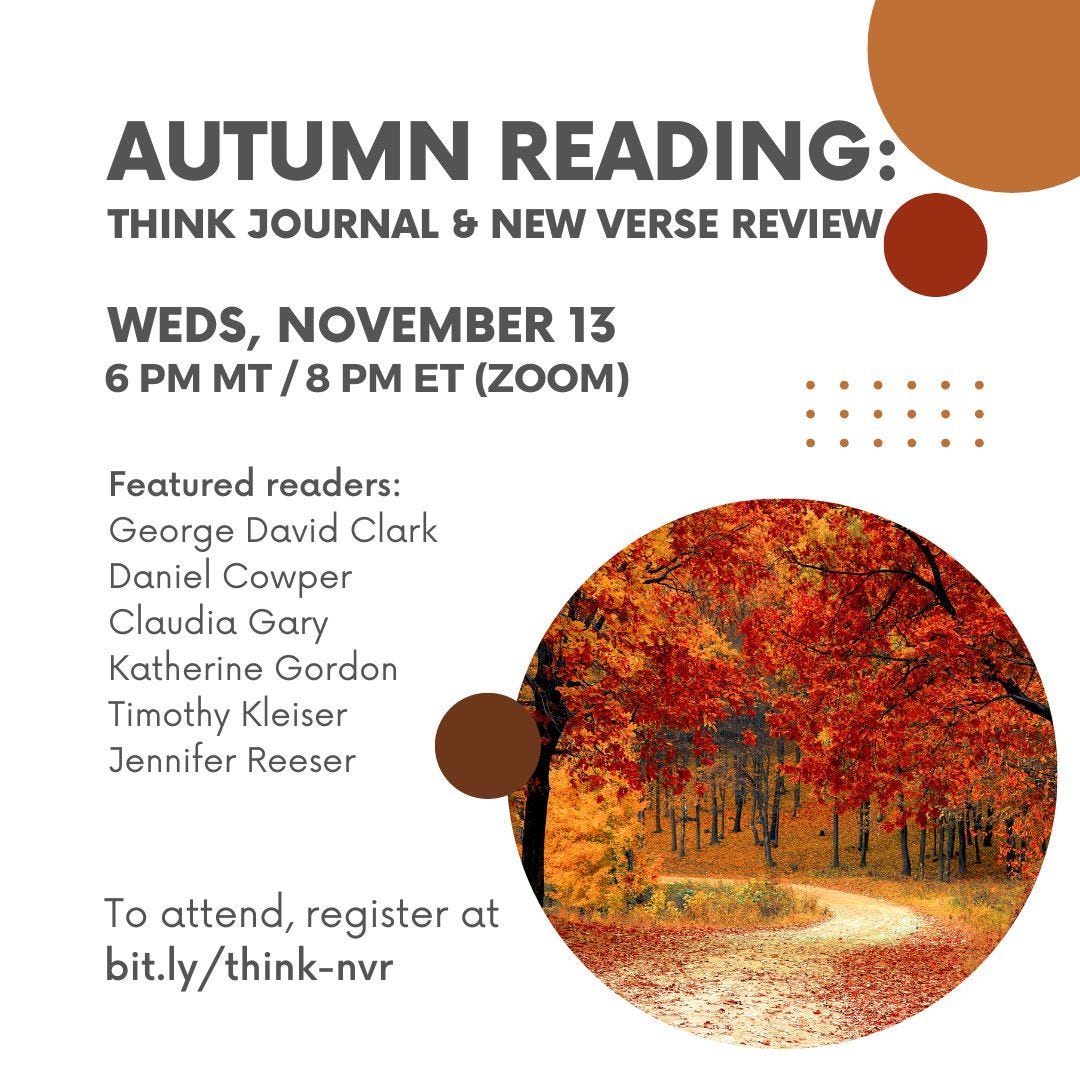The Rusty Paperweight: October '24
Autumn Odes, Elizabeth Bishop's Endings, James Merrill's Ouija Board
We are well into the spooky season. If you missed NVR’s Halloween mini-issue, check it out. There are thirty seasonal poems by thirty poets. Some of the poems are scary, some spooky or strange, some funny, some moving. All are well-crafted and memorable.
Next month, we’ll have our first guest curator at the Rusty Paperweight. Ethan McGuire, who recently wrote a piece for NVR about translating the Chinese poet Yue Fei, will prepare a links round-up for your enjoyment.
Remember, NVR will open for submissions to its winter issue on November 1.
But for now, have a Happy Halloween!
Kindred Spirits
Erica Reid and Brian Palmer of Think: A Journal of Poetry, Fiction, and Essays have kindly invited NVR to cohost an online reading on November 13 at 8:00 pm EST. It’s an honor to team up with one of today’s best form-friendly journals. Full details, including a great lineup of readers, on the flyer below. Consider adding this event to your calendar!
Literary Matters recently released its fall issue. It’s a veritable cornucopia, a mix of new material and a selection of some of the best work published during Ryan Wilson’s tenure as editor. This is Wilson’s final issue, and all of us in the poetry world owe him a debt of gratitude for his work at Literary Matters. Thankfully, in this issue, Wilson announced that the journal will continue under a new editor, John Matthew Steinhafel.
Editor Clarence Caddell recently released the inaugural issue of The Borough, an Australia-based journal of formal poetry. The first issue is a rich one, with work from several friends of NVR, including Dan Rattelle, Maryanne Corbett, Alex Rettie, Burl Horniachek, James Matthew Wilson, and Marly Youmans. Australian poets are also well-represented, including work by the great Stephen Edgar.
Alex Rettie has launched a new poetry site, Poems for Persons of Interest, which specializes in fun twelve-hour contests. So far, he has run sonnet, couplet, and carol contests. You can read the winning poems and selected other entries at the site. There’s some great Halloween reading among the couplet and carol poems.
Listen Up!
The Simpsons’ “Raven” and James Earl Jones
Here is a link to the classic 1990 Simpsons’ rendition of Edgar Allan Poe’s “The Raven.” It is narrated by James Earl Jones, who passed away in September. May he rest in peace.
Fred Chappell Documentary
NVR’s Halloween issue is dedicated to the memory of Fred Chappell (1936-2024), who grew up in the mountainous North Carolina town of Canton (which has been tragically devastated by the recent hurricane). Chappell became one of the most important poets and fiction writers of his generation. He loved the pulp magazines growing up, and he wrote a long fantasy poem early in his career and a fantasy novel late in life. His much more famous Appalachian writings combine wit, warmth…and the weird. He also wrote a fair amount of poetry in meter and rhyme. His soon-to-be-published posthumous collection Ever After, which I hope to review for NVR at some point, features many a sonnet. Chappell was a longtime professor at UNC Greensboro. Here’s a tribute to Chappell in the UNCG magazine. I especially appreciated the quotations from former students, many of whom have gone on to become significant writers. And here’s a link to a documentary about Chappell filmed by PBS North Carolina.
Poetry For All: Carl Phillips, “To Autumn”
In this episode of Poetry For All from 2022, Abram Van Engen, Joanne Diaz, and David Barker discuss Carl Phillips’s poem “To Autumn.” They talk about its conversation with Keats’s famous ode to the season, and they talk about the interesting interplay between ode and sonnet in Phillips’s poem.
Faith and Imagination with J.C. Scharl
The new season of the Faith and Imagination podcast, hosted by BYU’s Matthew Wickman, is underway. Here is a link to a particularly rich episode with the poet J. C. Scharl. They discuss poetic honesty, faith, and moral sensitivity. Scharl also reads several poems from her collection Ponds. (Ponds was the first collection reviewed at NVR early last summer.) The highlight for me was the reading and subsequent discussion of Scharl’s dramatic monologue “The Widow of Cana.”
Timothy Steele on Versecraft
Elijah Perseus Blumov interviews Timothy Steele for a recent episode of the Versecraft podcast. They discuss a forthcoming new edition of Steele’s classic guide All The Fun’s In How You Say a Thing: An Explanation of Meter and Versification. They also discuss Yvor Winters, Helen Pinkerton Trimpi, Thom Gunn, and Steele’s own poetry.
Around the Poetry World
Poems Ancient and Modern
Poems Ancient and Modern continues to offer excellent daily commentary on a range of poems. Joseph Bottum kindly discussed a poem from NVR 1.1: Benjamin Myers’s moving baseball sonnet “The Pitcher’s Arm.” Some of my other favorite recent PA&M posts include Sally Thomas on H.D.’s “After Troy” and on Lizette Woodworth Reese’s “All Hallows Night.” I also had a guest piece on Claude McKay’s “The Tropics in New York.”
New Issue of the Robert Frost Review
Issue #33 of the Robert Frost Review, edited by Virginia Smith with a little book review help from yours truly, was just released. Among other interesting pieces are A. M. Juster’s review of Brad Leithauser’s Rhyme’s Rooms: The Architecture of Poetry and Marissa Grunes’s insightful article on Frost’s friendship with Edward Thomas. Frost’s relationships with other poets are a central concern of the issue. Henry Wise reviews a new edition of Donald Hall’s Old Poets, which includes a reminiscence of Frost, and Jim Hurley discusses the sometimes testy relationship between Frost and the midwestern poet-farmer James Hearst.
Srikanth Reddy, “Hannah Arendt, Poet”
Srikanth Reddy has an intriguing piece in The Paris Review on the newly released Collected Poems of Hannah Arendt.
Yet her poems, unlike her philosophy, remained a private affair for Arendt to the end. We don’t know if she ever showed her poems to her close friends Robert Lowell, Randall Jarrell, and W. H. Auden in New York; to our knowledge, only her second husband, the poet and philosopher Heinrich Blücher, read her verse. The final poem to be found in the Library of Congress archive is labeled “January 1961, Evanston.” Its author was about to depart from a residency at Northwestern University to attend Adolf Eichmann’s trial in Jerusalem. What she saw there may have marked the end of poetry for Hannah Arendt.
I learned from David Yezzi’s Late Romance: Anthony Hecht—A Poet’s Life that Hecht was a friend of Arendt’s as well. I thought at the time that it would be interesting to see Hecht’s marginal notes on Arendt’s philosophical studies. Now I think it would be equally interesting to see Arendt’s notes on Hecht’s poetry.
Ed Simon, “The Unlikely Verse of H.P. Lovecraft”
Here’s a piece by Ed Simon in The Hedgehog Review on H. P. Lovecraft’s poetry, which is not nearly as well known as his weird fiction:
But when it comes to his better verse, part of what makes Lovecraft’s poetry interesting is the same quality that renders his prose so arresting—the union of an almost Victorian manner of description with a nihilistically modern sensibility. Even among the dross, there are poems that are interesting, even a few that are actually good. Most remarkable is the 1929 sonnet cycle of thirty-six poems, Fungi from Yoggeth. Working within the most venerable form of English poetry, the genre of Surrey and Wyatt, Shakespeare and Wordsworth, Lovecraft builds ingenious little fourteen-line mechanisms expressing a ghoulish sensibility. Ostensibly, the cycle recounts the journeys of a man in possession of a volume evocative of the Necronomicon which allows him to travel between parallel realities. However, as in the cosmic horror of his prose works, there is always Lovecraft’s potent anti-vision of a cold and dead universe.
Jane Greer Reintroduces Josephine Jacobsen
In a 2023 piece republished in the Literary Matters retrospective, Jane Greer “reintroduces” us to the neglected poet Josephine Jacobsen:
It’s not at all unusual for me to “discover” a good poet who turns out to be well-known to other poets. What is unusual is to find a poet who was, in her recent lifetime, widely honored and admired by her peers and readers, but is now seldom mentioned. Well-read friends of mine had never heard of her. Her name and poems rarely appear on social media or in any other media.
The swift disappearance of Josephine Jacobsen from the modern poetic landscape is a mystery and a shame. Her poetry is everything I hope for when I take a chance reading a poem: intelligent, confident; musical with meter, rhyme, and assonance; wry, rich with metaphor, filled with wonder and gratitude, and serving no agenda other than poetry’s. That’s a lot to hope for, and she never disappoints.
Jonathan Farmer on Elizabeth Bishop’s Endings
In At Length, Jonathan Farmer notes how many of Elizabeth Bishop’s excellent poems have surprisingly “flat endings.” It’s surely not a lack of poetic talent, so what could be up with this?
In a letter to Robert Lowell, Bishop apologized for what she called her “George Washington-handicap. I can’t tell a lie even for art, apparently; it takes an awful effort or a sudden jolt to make me alter facts.” Here, too, she was downplaying things—trying to take the sting out of some of the corrections she was making to a poem Lowell had sent her. But accuracy was a kind of bedrock for her—a condition of virtue and a protection against excess. When Lowell not only pilfered from but altered Elizabeth Hardwick’s anguished letters to him for his poems, she was outraged: “art just isn’t worth that much.” She described the alterations as “infinite mischief.” They messed with something—someone—real.
All those flat endings feel like an argument made by mimesis, Bishop the artist enacting an allegiance with reality, willing to stand against art if needed—so much so, once you start to line them up, that reality risks subservience to the proposition of her art. But they aren’t insincere. And though they never, to my ear, do justice to the writing that precedes them, they still cast light on her best work. And they may reveal something about art’s potentials, too.
James Merrill’s Ouija Board
Merrill Biographer Langdon Hammer writes about the Ouija board, now housed at Yale’s Beinecke Library, that inspired the strange three-volume epic The Changing Light at Sandover.
Merrill and Jackson’s homemade Ouija board and the dime store tea cup they used as a pointer—glued together after more than one occasion when the spirits pushed it off the table in a pique—are kept in Yale’s Collection of American Literature at the Beinecke Rare Book and Manuscript Library. These unusual tools of one writer’s rather mad compositional method were a gift to the library from J. D. McClatchy ’74PhD, adjunct professor of English at Yale, editor of the Yale Review, and one of Merrill’s two literary executors.
With his left hand on the cup, Merrill used his right to record letters, sorting the lexical lava into words and sentences. One of the transcripts pictured here recounts the destruction of a world before ours in a nuclear explosion. It is inscribed to “dearest Sandy”—McClatchy’s nickname—by DJ and JM, who call it “a page saved from the pyre.” The “pyre” refers not to a primeval apocalypse, but to Merrill’s choice to burn the Ouija transcripts he used to write Sandover. The pages shown here made it to the Beinecke, however, safe with the board and cup.
The Thing Itself
Josiah Cox’s “Two Owls” in First Things (winner of the 2024 First Things Poetry Prize)
Ryan Wilson’s “Gather Ye” in First Things (second place for the 2024 First Things Poetry Prize)
Boris Dralyuk, “Universal Horror” in First Things
Nicole Caruso Garcia’s “The Autumn Thief” in Mezzo Cammin
Priscilla Long’s “Cellar Poem” in The Hudson Review
Sydney Lea’s “Dusk in a Marble Orchard” and “Hangman’s Moon” in Action, Spectacle
Liam Guilar’s seven extracts from Culhwch ac Olwen in The High Window
Locklyn Wilchynski’s “Deer Daughter” in Grim & Gilded
Deanie Vallone’s “The Vineyard” in Grim & Gilded
Juleigh Howard-Hobson’s “People Will Not Believe” in Exquisite Death
A.E. Stallings’s “The Plum Tree” in The London Review of Books
Ernest Hilbert’s “Monster-Mania Con 44” via E-Verse Radio
Ned Balbo’s “Shirts of the Distant Past” in Rattle (Be sure to listen to the audio of the song version too!)
Anita Brooke’s “Phone Zombie” in Lighten Up Online
Jane Blanchard’s “RIP, or Not” in Lighten Up Online
Contemporary Classics
Fred Chappell’s “Scarecrow Colloquy”—here are the opening stanzas
What ho, Ragwisp, how fares my Sentinel of the Stars?
Have you yet fixed for good the thrust of history?
I find you in the field as entranced as St. Jerome.
I am glad, friend, of your company.
The man who nailed me up, left me to challenge
The courage of the crow, does he still thrive?
Or has this age of snow buried him beneath?
I know him of old, high Hayhead. What would you of him?
That he unfold the motive of your wry construction?
He being who he is can never say.
The farmer he is who maintains the straggling fenceline.
He studies a-night, the gleam of his window gives
A point to my musing. Let him come riddle me
From his big book the question and solution.




